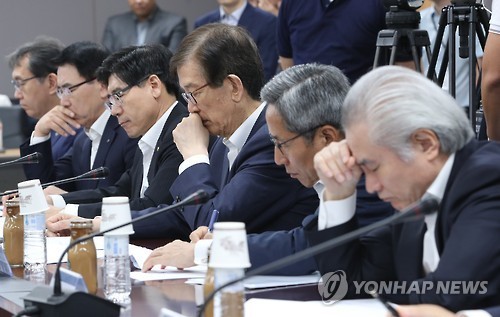South Korea's chief financial regulator called on the nation's umbrella bank union Wednesday to withdraw its plan to go on a general strike later this week, saying such a collective action will never win public support especially at a time when the local banking industry faces a "life-or-death" crisis.
Yim Jong-yong, chairman of the Financial Services Commission, delivered the message in a meeting with the heads of seven major local banks to discuss ways to deal with the move by the Korean Financial Industry Union. The session was also joined by Zhin Woong-seob, governor of the Financial Supervisory Service, the FSC's supervisory arm.
 |
The heads of major South Korean banks attend a government-organized meeting in Seoul on Sept. 21, 2016, to discuss countermeasures against a general strike plan by unionized bank workers. (Yonhap) |
The union plans to stage a general strike on Friday at Sangam World Cup Stadium in western Seoul in protest against the government-driven introduction of a full-fledged performance-linked pay system.
The union, which claims more than 100,000 members nationwide, said most of them are expected to take part in the walkout, adding additional collective actions are being considered.
The FSC chief said it's deplorable that the unionized bank workers have opted for the "extreme means" when there is "even a talk of the possibility of the domestic banking sector collapsing."
He cited the worsening profitability due to low growth and interest rates, coupled with growing burdens for non-performing loans amid corporate restructuring, as well as fierce competition with fintech firms.
"It's time for the management and the labor to join forces and make every effort to secure a new growth engine," Yim stressed.
He reaffirmed the government's resolve to cope with the union's strike, if carried out, with no mercy.
Besides the "no work, no pay" principle, the union will be held responsible legally for damages from the strike, Yim said.
He asked the financial authorities and the management of banks to endeavor to persuade the union to change its course and draw up contingency plans to minimize consumers' inconveniences in case of a strike.
Yim said the government will continue to push for the performance-based pay system as part of reform measures for the banking industry.
The government, though, is open to discussions with workers on the details of implementing the system, he added.
Meanwhile, Yim ordered a joint task force of the FSC and the FSS to meet once a week to handle the household debt problem. He also requested local banks to cooperate actively in the desperate campaign to slow the growth of household debt.
The nation's total household credit jumped 11.1 percent on-year to an all-time high of 1,257.3 trillion won ($1,124 billion) as of the end of the second quarter of this year, mainly attributable to a strong demand for new apartments spurred by low borrowing costs.
Last month, the government announced a fresh package of measures including a plan to control the supply of new apartments to curb demand for mortgage loans.
But skepticism is widespread over whether the policy will bear fruit, with housing prices continuing to rise since the announcement. (Yonhap)





![[Exclusive] Hyundai Mobis eyes closer ties with BYD](http://res.heraldm.com/phpwas/restmb_idxmake.php?idx=644&simg=/content/image/2024/11/25/20241125050044_0.jpg)
![[Herald Review] 'Gangnam B-Side' combines social realism with masterful suspense, performance](http://res.heraldm.com/phpwas/restmb_idxmake.php?idx=644&simg=/content/image/2024/11/25/20241125050072_0.jpg)

